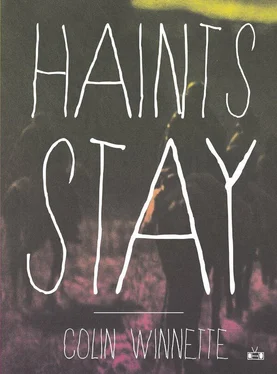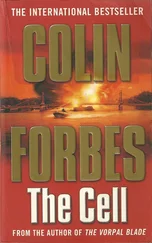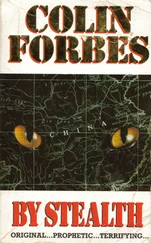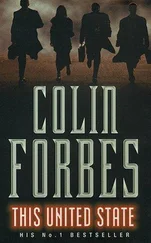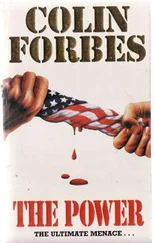“Stop torturing it,” said Sugar. He was on his knees and rolling one of the stained blankets he’d gained from yesterday’s piles.
“I’m not,” said the boy. The bird’s visible eye was wide and still, calm-seeming. Matter-of-factly, it watched the boy, the woods, the dirt, as the creature writhed and pumped its body toward escape. The boy applied his palm and full grip to the bird’s head, shutting out the light. He wrenched the handful in a small circle away from his own body. The neck did not snap, but grated and ground like dirt in a blanket before the bird set to convulsing and the boy lost its body again. It pumped against the dirt and sent up rings of dust into the sunlight angling at their camp. The boy set himself before it and wiped the sweat from his brow and was nearly set to cry before Sugar approached and cut the neck of the bird in a circle until the head fell back into the dust and stained where it came to rest. He tossed the body into the woods and went back to his blanket and the bundles he would tie it to.
“You had a knife,” said the boy. “I didn’t have a knife.”
“I told you to stop torturing it,” said Sugar.
“But I didn’t have a knife,” said the boy. “You did and that’s what made it easy.”
“Why were you pitted against a bird?” said Sugar.
The boy had moved toward the woods now, in the direction of the bird’s abandoned body.
“It was after our meat,” said the boy.
“It couldn’t have taken much,” said Sugar.
He was watching the boy now, who was circling the base of tree after tree for the bird’s body and coming up with nothing.
“You won’t find it like that,” said Sugar, but the boy did not let up.
“Imagine my throw,” said Sugar. “Trace the line extending from me exactly as you imagine it. Don’t bother yourself with where it might have gone. Picture exactly where it went and start there.”
“I can’t remember your throw,” said the boy, without looking up, moving in circles around the base of each tree, one after the other.
“Don’t remember it, just picture it. Just picture it in your head and follow that picture exactly.”
Finally, the boy stopped and walked back to stand near Sugar, who was still and watching the boy with his hands at his sides.
“Is this where we were?”
Sugar did not respond.
The boy stood a moment then walked a hard line toward the woods.
“It’s here,” he said, lifting the headless carcass of a small black bird.
“See?” said Sugar.
“There’s really no meat on it,” said the boy.
“I know,” said Sugar.
The boy let the bird fall.
“You don’t want it?” said Sugar.
“I just wanted to get it and have that be easy,” said the boy.
“You didn’t have to try hard to find it,” said Sugar.
“You told me where it was,” said the boy.
Sugar shook his head.
Brooke was up then and packed in no time at all. He paused at the bird’s head and rolled it with the toe of his boot. Sugar was smoking against a tree with his bundle and blanket at his feet and the boy was squatted nearby, drawing in the dirt with a fingertip.
“Whatever it was that got you, got you good,” said Brooke. “You’re more horse than boy.”
The boy looked at his waist, his smooth hands.
“What do you mean?”
“Nothing bad,” said Brooke. “I loved my horse.”
“Where’s your horse now?” said the boy.
Brooke shrugged. “Died,” he said.
“I’m sorry,” said the boy.
Sugar stubbed his cigarette.
“I think I’d like to learn more about you,” said Brooke.
“I told you,” said the boy, “I don’t know any more than you.” He itched the back of his skull, ran the length of a finger along the lobe of his ear.
“Yes, you did,” said Brooke. “But if we were to know someone who might know something, you wouldn’t be opposed to us asking around about you, right?”
“Who do you know?” said the boy.
“Just someone who knows things,” said Brooke. He pulled an edge of meat from one of the bundles and cut its corner loose with the tip of the curving knife.
The boy nodded and Brooke cut him a piece too.
“We’re killing time anyway,” said Brooke, “and trying to keep ourselves moving. We might as well head toward him, and see what he might be able to bring to bear on the situation.”
Sugar was bent at the waist, a hand on either knee, gulping air and holding his eyelids shut while Brooke went on.
“And maybe he knows something about the way the boy looks or where he might have come from, something to help us along. It seems as good a plan as any.”
The convulsions took Sugar again and he loosed another smatter of acid and mucous onto the slick dirt before him.
“I don’t care,” Sugar managed. “Just leave me.”
“We’re going,” said Brooke, standing at the boy who was still crouched and fingering the dirt. “We’re going to our friend and he’ll tell us all about you.”
“Okay,” said the boy. Then, “What’s wrong with him?” gesturing at Sugar.
“Stomach,” said Brooke. “I don’t know. Maybe the meat. Or it’s just early and he’s unsettled.”
The sun was nearly raised and the woods were coming to bloom around them. A handful of birds in the trees just above were mocking the boy or mourning their dead or crying out for something, there was no knowing what. The boy threw a small rock to scatter them, but only one lifted before settling back as it had been.
“Don’t,” said Sugar. “It’s annoying.”
He wiped his mouth with his sleeve and kicked some of the dust at his feet onto the mucous and stomach acid he’d abandoned there.
“You insist you have no name?” said Sugar.
The boy shrugged, shook his head.
“Then we’ll call you Bird,” said Sugar.
“I don’t like it,” said the boy.
“It suits him,” said Brooke, nodding to Sugar.
“But I don’t like it,” said the boy.
“Bird for now,” said Brooke.
“Bird until we find out something different,” said Sugar.
“So we’re going?” said Brooke.
“We’ll go,” said Sugar.
They left.
They had little to carry, the bundles of decaying meat and a few stained blankets. They moved quickly and quietly and saw little else throughout the day, other than birds and a few salamanders. Bird could swear the birds were following them, but Sugar assured him it was only his conscience, his self-involvement.
“You’re imagining what’s happening out there’s got anything to do with you,” said Sugar. “It doesn’t.”
“But if someone hurt Brooke you’d chase them down,” said Bird. “Because.”
“I would,” said Sugar.
“So what’s to say the birds aren’t doing that?”
“Even if they are, it’s still got nothing to do with you really. It’s out of your hands, and they’re no risk to you.”
“But I know why they’re doing it, and it’s me is why they’re doing it.”
“You put your hand in a lake, withdraw it, and the surface moves for a bit,” said Sugar, “it snaps back into place or it ripples on and on. Your involvement ends the moment your hand leaves the water.”
“We’re here,” said Brooke.
It looked no different from any other patch of wood. The boy was not even sure in which direction he should be looking.
“You take Bird,” said Brooke.
Sugar placed his hand on the boy.
“After you,” said Sugar.
“What do I do?”
“Walk,” said Sugar.
“What’s Brooke going to do?”
“Wait,” said Brooke.

As they walked, the woods seemed to bruise. It was nearly, suddenly, evening.
Читать дальше
